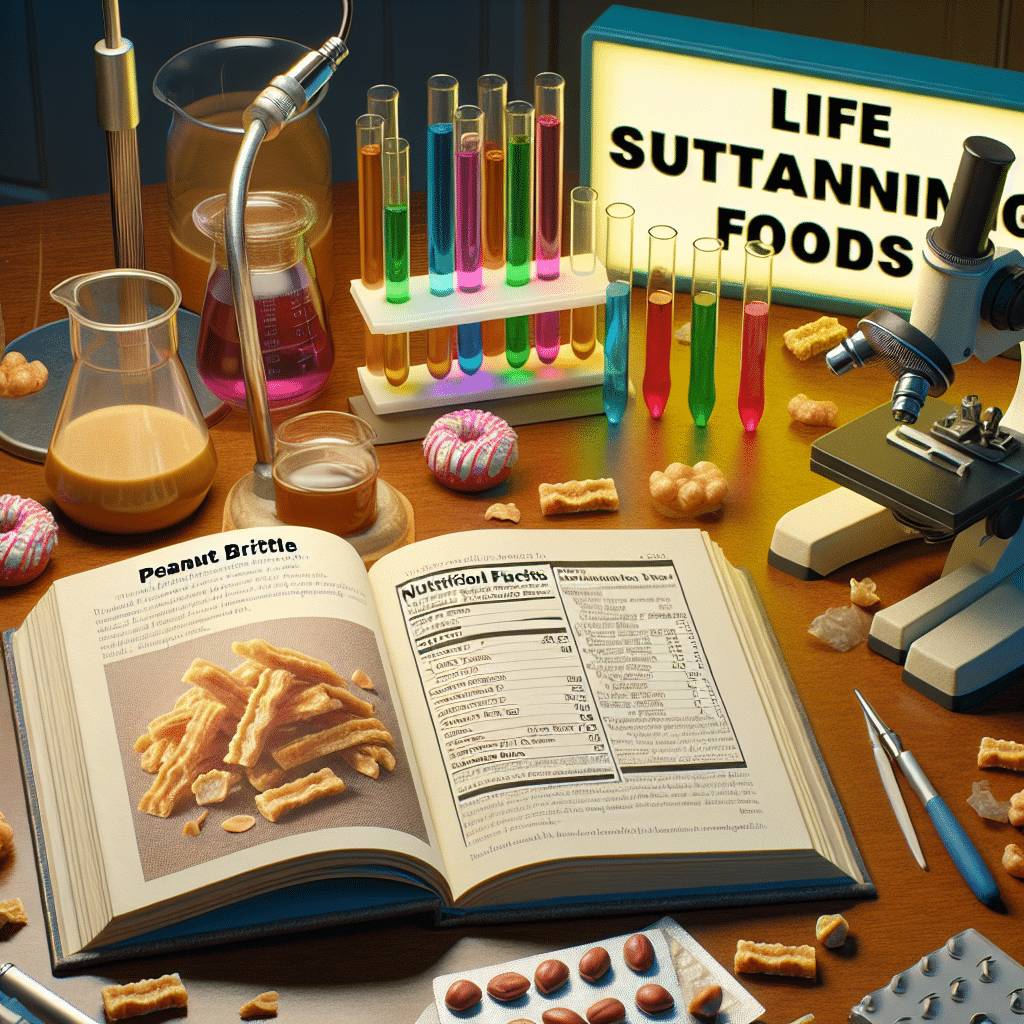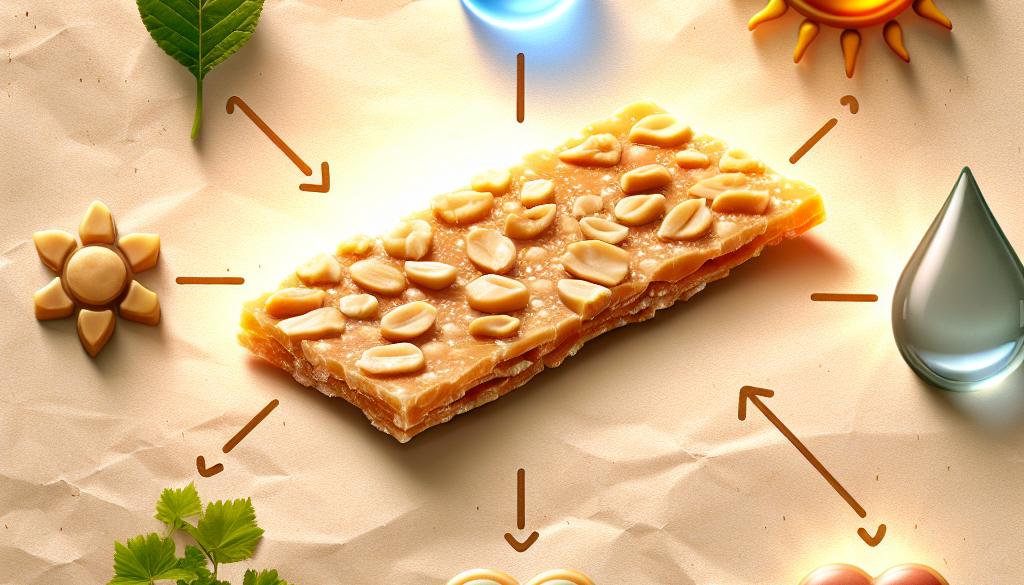Does Peanut Brittle Have Life Sustaining Properties?
-
Table of Contents
- Peanut Brittle: Assessing Its Nutritional Value and Life-Sustaining Properties
- Understanding Peanut Brittle and Its Ingredients
- Nutritional Profile of Peanut Brittle
- Life-Sustaining Foods: Criteria and Examples
- Can Peanut Brittle Be Considered Life-Sustaining?
- Healthier Alternatives to Peanut Brittle
- Case Studies and Research on Peanut Consumption
- Conclusion: The Verdict on Peanut Brittle’s Nutritional Value
- Enhance Your Diet with ETprotein’s High-Quality Protein Products
Peanut Brittle: Assessing Its Nutritional Value and Life-Sustaining Properties

Peanut brittle is a classic confection made from a mixture of sugar, butter, and peanuts. This sweet treat has been enjoyed for generations, often associated with holiday traditions and family gatherings. But beyond its role as a delicious snack, some may wonder about the nutritional content of peanut brittle and whether it possesses any life-sustaining properties. In this article, we will delve into the components of peanut brittle, examine its nutritional profile, and explore the concept of life-sustaining foods to determine if peanut brittle can be considered as such.
Understanding Peanut Brittle and Its Ingredients
Peanut brittle is a type of candy that typically consists of hard sugar candy embedded with peanuts. The basic ingredients include:
- Granulated sugar
- Corn syrup
- Butter
- Baking soda
- Salted peanuts
These ingredients are cooked together until the sugar caramelizes, creating a hard, crunchy texture that is then broken into pieces once cooled. While the primary ingredient, peanuts, is known for its nutritional benefits, the high sugar content in peanut brittle raises questions about its overall healthfulness.
Nutritional Profile of Peanut Brittle
To assess whether peanut brittle has life-sustaining properties, it’s important to understand its nutritional profile. Here are the key components:
- Calories: Peanut brittle is calorie-dense, primarily due to its sugar and fat content.
- Macronutrients: It contains carbohydrates (mostly sugars), fats (from the peanuts and butter), and a moderate amount of protein (from the peanuts).
- Vitamins and Minerals: Peanuts provide essential nutrients such as B vitamins, vitamin E, magnesium, phosphorus, and potassium.
- Fiber: Peanuts contribute dietary fiber to peanut brittle, although the overall fiber content may be low due to the high sugar ratio.
While peanuts themselves are nutritious, the additional ingredients in peanut brittle modify its nutritional value, making it less ideal as a staple food source.
Life-Sustaining Foods: Criteria and Examples
Life-sustaining foods are those that provide the necessary nutrients to support human life and health. These foods typically:
- Are rich in essential nutrients like vitamins, minerals, and antioxidants
- Contain a balance of macronutrients: proteins, carbohydrates, and fats
- Provide dietary fiber for digestive health
- Offer hydration or support the body’s ability to maintain fluid balance
Examples of life-sustaining foods include fruits, vegetables, whole grains, lean proteins, and legumes. These foods are integral to a balanced diet and can support long-term health and well-being.
Can Peanut Brittle Be Considered Life-Sustaining?
Given the criteria for life-sustaining foods, peanut brittle falls short in several areas:
- The high sugar content can lead to energy spikes and crashes, and over time, contribute to health issues like obesity and diabetes.
- The lack of balance in macronutrients, with an emphasis on carbohydrates and fats over protein, does not align with the profile of a life-sustaining food.
- While peanuts provide some nutrients, the overall vitamin and mineral content is diluted by the candy’s sugar and fat.
- Peanut brittle lacks sufficient dietary fiber and hydration to support digestive and overall health.
Therefore, while peanut brittle contains some beneficial nutrients from peanuts, it cannot be considered a life-sustaining food on its own.
Healthier Alternatives to Peanut Brittle
For those seeking the nutritional benefits of peanuts without the drawbacks of high sugar content, there are healthier alternatives to consider:
- Raw or dry-roasted peanuts without added salt or sugar
- Natural peanut butter spread on whole-grain bread or fruit
- Peanut-based energy bars with low sugar content and added whole grains
- Homemade peanut brittle with reduced sugar and added seeds or dried fruit for extra nutrients
These alternatives provide a more balanced approach to enjoying peanuts as part of a nutritious diet.
Case Studies and Research on Peanut Consumption
Several studies have highlighted the benefits of peanut consumption:
- A study published in JAMA Internal Medicine found that nut consumption, including peanuts, was associated with a lower risk of total mortality and cardiovascular disease.
- Research in the British Journal of Nutrition indicated that peanut consumption could improve heart health due to its monounsaturated fat content.
- The American Journal of Clinical Nutrition reported that frequent nut consumption is associated with a reduced risk of weight gain and obesity.
These studies support the inclusion of peanuts in a balanced diet but do not specifically address peanut brittle.
Conclusion: The Verdict on Peanut Brittle’s Nutritional Value
In conclusion, while peanuts are a nutritious food with potential health benefits, peanut brittle’s high sugar and fat content overshadow these advantages. As such, peanut brittle should not be considered a life-sustaining food. It is best enjoyed in moderation as a treat rather than a dietary staple. For those looking to incorporate the nutritional benefits of peanuts into their diet, opting for healthier alternatives is advisable.
Enhance Your Diet with ETprotein’s High-Quality Protein Products
If you’re seeking to improve your nutritional intake with high-quality protein sources, consider ETprotein’s range of products. ETprotein is a reputable peanut protein Chinese factory manufacturer and supplier, offering a variety of organic bulk vegan protein and plant proteins. Their products are ideal for those looking to enrich their diet with essential nutrients while maintaining a commitment to non-GMO, allergen-free ingredients.
About ETprotein:
ETprotein, a reputable peanut protein Chinese factory manufacturer and supplier, is renowned for producing, stocking, exporting, and delivering the highest quality organic bulk vegan protein and plant proteins. They include Organic rice protein, clear rice protein, pea protein, clear pea protein, pumpkin seed protein, sunflower seed protein, mung bean protein, peanut protein etc. Their offerings, characterized by a neutral taste, non-GMO, allergen-free attributes, cater to a diverse range of industries. They serve nutraceutical, pharmaceutical, cosmeceutical, veterinary, as well as food and beverage finished product distributors, traders, and manufacturers across Europe, USA, Canada, Australia, Thailand, Japan, Korea, Brazil, and Chile, among others.
ETprotein specialization includes exporting and delivering tailor-made protein powder and finished nutritional supplements. Their extensive product range covers sectors like Food and Beverage, Sports Nutrition, Weight Management, Dietary Supplements, Health and Wellness Products, and Infant Formula, ensuring comprehensive solutions to meet all your protein needs.
As a trusted company by leading global food and beverage brands and Fortune 500 companies, ETprotein reinforces China’s reputation in the global arena. For more information or to sample their products, please contact them and email sales(at)ETprotein.com today.














